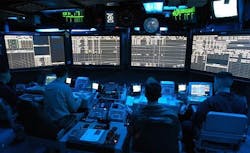Terrorist hackers tampering with financial data are some of largest cyber security threats
SIMI VALLEY, Calif., 30 Nov. 2015. Computer hackers connected to radical Islamic terrorists, and hackers tampering with computer financial data are two emerging challenges to U.S. cyber security experts, says one of the nation's top cyber warriors.
A potential inability to trust financial data due to terrorist manipulation, and terrorist hackers who care little for the consequences of reprisals are big issues today, says Navy Adm. Mike Rogers, commander of U.S. Cyber Command and director of the National Security Agency.
Rogers made his comments during a recent panel on cyber warfare at the annual Reagan National Defense Forum in Simi Valley, Calif. Rogers joined Marcel Lettre, acting undersecretary of defense for intelligence, and others on the panel.
Rogers says data manipulation through network intrusion is probably his number-one concern. “As a military commander, I'm used to the idea that I can walk into a darkened space with a lot of sensors coming together and look at a visual image that uses color, geography and symbology, and quickly assimilate what's going on and make very quick tactical decisions,” Rogers says.
“But what happens if what I'm looking at does not reflect reality ... [and] leads me to make decisions that exacerbate the problem I'm trying to deal with [or] make it worse?” he adds.
His second concern from a military perspective involves non-state actors. “Nation-states, while they want to gain an advantage,” he says, “generally have come to the conclusion that if the price of gaining that advantage is destroying or destabilizing the basic status quo and underpinnings that we've all come to count on, that's probably not in their best interest.”
With non-state actors like ISIS or al-Qaida, that premise is gone, Rogers adds. They are interested in destroying the status quo to achieve their vision of the world as it should be, he says.
“So what happens when they suddenly start viewing cyber as a weapon system, as a capability that helps them achieve that end state -- and one they can use as a vehicle to achieve destruction and disorder, just as we're watching them do in the kinetic world?”
Lettre says the cyber threat is as challenging as the nation has seen in 50 years. Defense Secretary Ashton Carter and Deputy Defense Secretary Robert Work “have been pushing for ... an innovative approach [and] innovation in technologies to try to tackle this strategic landscape and deal with these challenges,” he says.
The Pentagon's Cyber Strategy focuses on three missions, Lettre says: defending military networks; dealing with attacks on the homeland; and giving cyber options to combatant commanders. “Attacking the cyber-defense challenge really does require partnerships with industry and partnerships with international allies,” Lettre says.
In October the General Services Administration put out a five-year, $460 million multiple-award request for proposals to outsource Cybercom mission support.
“We turn to the private sector to harness the abilities and their capabilities to generate the tools DoD needs to execute its broad mission to defend the nation and protect our interests,” Rogers says.

